八年级英语备课笔记
英语8年级笔记
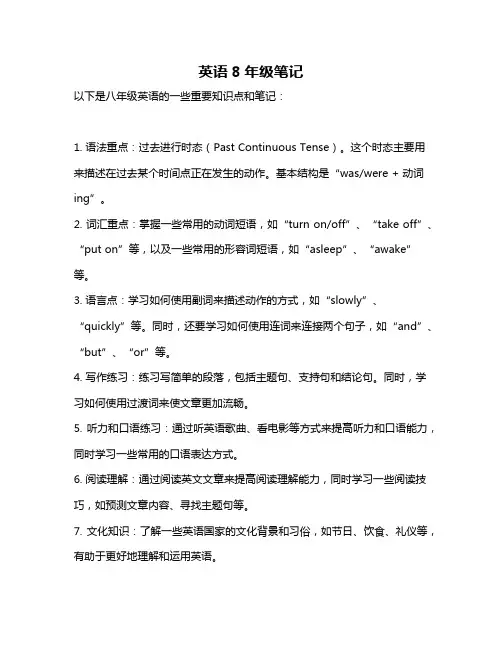
英语8年级笔记
以下是八年级英语的一些重要知识点和笔记:
1. 语法重点:过去进行时态(Past Continuous Tense)。
这个时态主要用来描述在过去某个时间点正在发生的动作。
基本结构是“was/were + 动词ing”。
2. 词汇重点:掌握一些常用的动词短语,如“turn on/off”、“take off”、“put on”等,以及一些常用的形容词短语,如“asleep”、“awake”等。
3. 语言点:学习如何使用副词来描述动作的方式,如“slowly”、“quickly”等。
同时,还要学习如何使用连词来连接两个句子,如“and”、“but”、“or”等。
4. 写作练习:练习写简单的段落,包括主题句、支持句和结论句。
同时,学习如何使用过渡词来使文章更加流畅。
5. 听力和口语练习:通过听英语歌曲、看电影等方式来提高听力和口语能力,同时学习一些常用的口语表达方式。
6. 阅读理解:通过阅读英文文章来提高阅读理解能力,同时学习一些阅读技巧,如预测文章内容、寻找主题句等。
7. 文化知识:了解一些英语国家的文化背景和习俗,如节日、饮食、礼仪等,有助于更好地理解和运用英语。
以上是八年级英语的一些重点知识点和笔记,希望能对你有所帮助。
八年级下册人教版英语笔记

八年级下册人教版英语笔记一、Unit 1 What's the matter?1. 重点单词。
- matter:n. 问题;事情。
常用搭配:What's the matter (with sb.)? = What's wrong (with sb.)? = What's the trouble (with sb.)?(某人)怎么了?- sore:adj. 疼痛的;酸痛的。
例如:a sore throat喉咙痛。
- stomachache:n. 胃痛;腹痛。
- foot:n. 脚;足。
复数形式是feet。
- neck:n. 脖子;颈部。
- fever:n. 发烧。
have a fever发烧。
- lie:v. (lay - lain)躺;平躺。
lie down躺下。
- rest:v. & n. 放松;休息。
take breaks/take a break = have a rest休息。
- cough:v. & n. 咳嗽。
have a cough咳嗽。
- toothache:n. 牙痛。
2. 重点短语。
- have a cold:感冒。
- have a stomachache:胃痛。
- lie down and rest:躺下休息。
- drink some hot tea with honey:喝些加蜂蜜的热茶。
- see a dentist:看牙医。
- get an X - ray:拍X光片。
- take one's temperature:量体温。
3. 重点句型。
- What should I do? 我应该做什么?- You should see a dentist and get an X - ray. 你应该去看牙医并拍X光片。
- Should I put some medicine on it? 我应该在上面敷些药吗?- Yes, you should. / No, you shouldn't. 是的,你应该。
【教案分享】新目标英语八年级教学笔记unit9
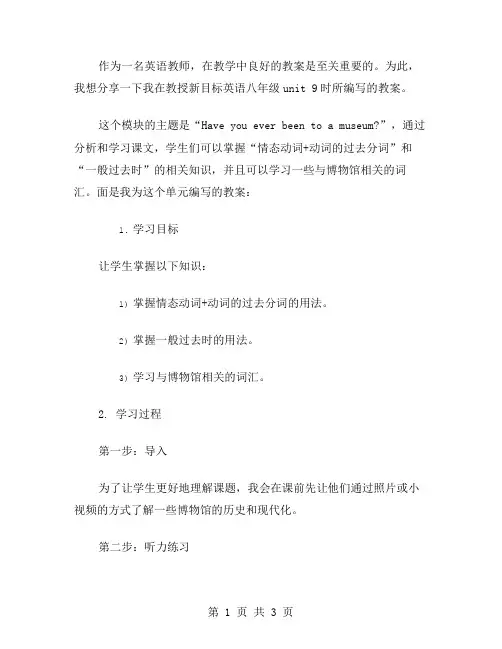
作为一名英语教师,在教学中良好的教案是至关重要的。
为此,我想分享一下我在教授新目标英语八年级unit 9时所编写的教案。
这个模块的主题是“Have you ever been to a museum?”,通过分析和学习课文,学生们可以掌握“情态动词+动词的过去分词”和“一般过去时”的相关知识,并且可以学习一些与博物馆相关的词汇。
面是我为这个单元编写的教案:1.学习目标让学生掌握以下知识:1)掌握情态动词+动词的过去分词的用法。
2)掌握一般过去时的用法。
3)学习与博物馆相关的词汇。
2. 学习过程第一步:导入为了让学生更好地理解课题,我会在课前先让他们通过照片或小视频的方式了解一些博物馆的历史和现代化。
第二步:听力练习在听力练习中,学生需要听力课文并填写相关的练习题。
我会在课前练习一下这个环节,以确保学生理解课文和相关题目的意义。
第三步:阅读练习在这个环节中,学生会读课文并回答相关的问题。
我会要求他们阅读一些对话并做出一些简单的判断题。
第四步:语法学习在这个环节中,学生将学习情态动词+动词的过去分词和一般过去时的用法。
为了帮助学生理解,我将为他们提供一些例子,并要求他们进行相关的练习。
第五步:词汇学习在这个环节中,学生将学习与博物馆相关的单词。
我会为他们提供一些相关的图像并鼓励他们使用这些词汇进行会话。
第六步:综合练习在这个环节中,学生需要完成一些课文和语法练习,这些练习将帮助他们回顾和巩固所学的知识点。
第七步:巩固与延伸我会要求学生进行课后练习,并在下一节课前完成相关的考试。
我会也会给他们一些延伸练习,以扩展他们的知识。
3. 教学反思我认为,该教案的设计可以很好地帮助学生掌握和理解已学习的知识点。
通过语法练习,学生可以巩固和加深对语法知识点的理解和掌握。
而词汇学习则可以扩展学生的词汇量。
听力和阅读练习也可以加强学生的听说能力和阅读能力。
我认为这个教案的设计可以帮助学生更好地掌握英语,让他们在日常生活和学习中更自如地使用英语。
英语笔记八年级上册
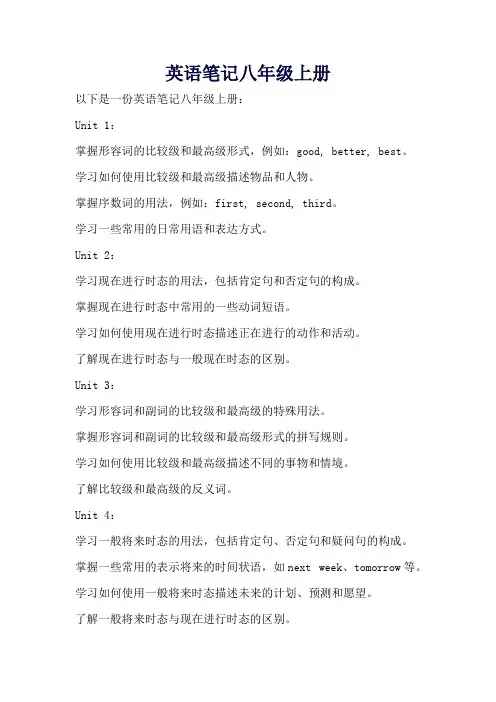
英语笔记八年级上册
以下是一份英语笔记八年级上册:
Unit 1:
掌握形容词的比较级和最高级形式,例如:good, better, best。
学习如何使用比较级和最高级描述物品和人物。
掌握序数词的用法,例如:first, second, third。
学习一些常用的日常用语和表达方式。
Unit 2:
学习现在进行时态的用法,包括肯定句和否定句的构成。
掌握现在进行时态中常用的一些动词短语。
学习如何使用现在进行时态描述正在进行的动作和活动。
了解现在进行时态与一般现在时态的区别。
Unit 3:
学习形容词和副词的比较级和最高级的特殊用法。
掌握形容词和副词的比较级和最高级形式的拼写规则。
学习如何使用比较级和最高级描述不同的事物和情境。
了解比较级和最高级的反义词。
Unit 4:
学习一般将来时态的用法,包括肯定句、否定句和疑问句的构成。
掌握一些常用的表示将来的时间状语,如next week、tomorrow等。
学习如何使用一般将来时态描述未来的计划、预测和愿望。
了解一般将来时态与现在进行时态的区别。
八年级英语听课笔记范文10篇
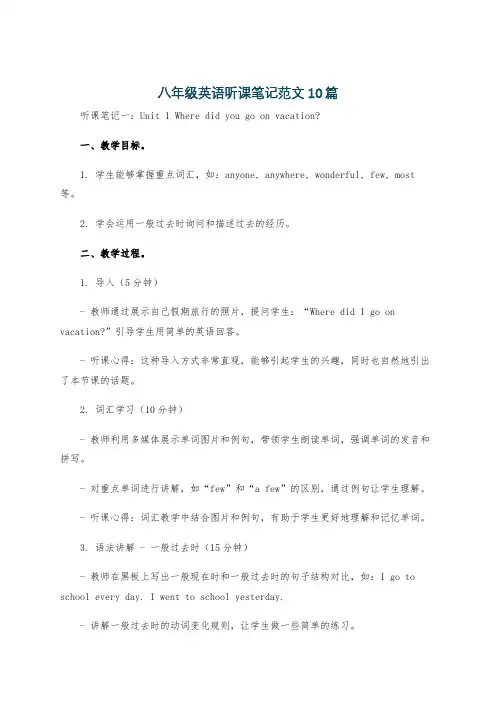
八年级英语听课笔记范文10篇听课笔记一:Unit 1 Where did you go on vacation?一、教学目标。
1. 学生能够掌握重点词汇,如:anyone, anywhere, wonderful, few, most 等。
2. 学会运用一般过去时询问和描述过去的经历。
二、教学过程。
1. 导入(5分钟)- 教师通过展示自己假期旅行的照片,提问学生:“Where did I go on vacation?”引导学生用简单的英语回答。
- 听课心得:这种导入方式非常直观,能够引起学生的兴趣,同时也自然地引出了本节课的话题。
2. 词汇学习(10分钟)- 教师利用多媒体展示单词图片和例句,带领学生朗读单词,强调单词的发音和拼写。
- 对重点单词进行讲解,如“few”和“a few”的区别,通过例句让学生理解。
- 听课心得:词汇教学中结合图片和例句,有助于学生更好地理解和记忆单词。
3. 语法讲解 - 一般过去时(15分钟)- 教师在黑板上写出一般现在时和一般过去时的句子结构对比,如:I go to school every day. I went to school yesterday.- 讲解一般过去时的动词变化规则,让学生做一些简单的练习。
- 听课心得:语法讲解清晰明了,对比的方式让学生更容易掌握两种时态的区别。
4. 对话练习(15分钟)- 教师给出对话模板,让学生两人一组进行对话练习,内容是关于假期去了哪里,做了什么。
- 巡视课堂,对学生的对话进行指导和纠正。
- 请几组学生上台展示对话。
- 听课心得:对话练习能够提高学生的口语表达能力,上台展示也增加了学生的自信心。
5. 课堂小结与作业布置(5分钟)- 教师总结本节课的重点内容,包括词汇和语法。
- 布置作业:写一篇关于自己假期经历的短文,运用一般过去时。
- 听课心得:课堂小结有助于学生巩固知识,作业布置合理,能够让学生进一步巩固所学内容。
初中英语八年级上册备课笔记
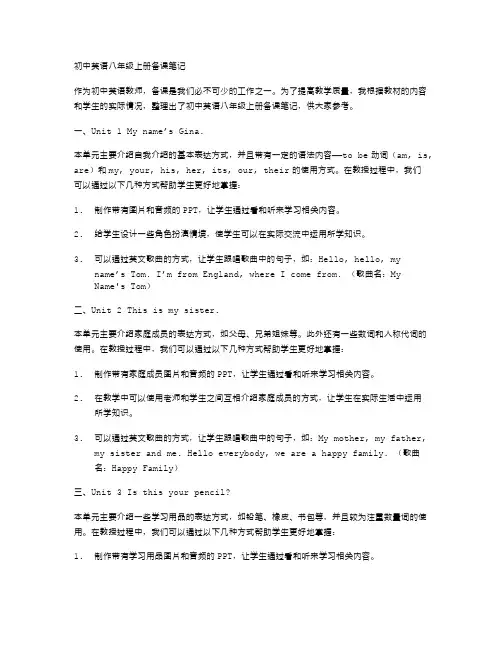
初中英语八年级上册备课笔记作为初中英语教师,备课是我们必不可少的工作之一。
为了提高教学质量,我根据教材的内容和学生的实际情况,整理出了初中英语八年级上册备课笔记,供大家参考。
一、Unit 1 My name’s Gina.本单元主要介绍自我介绍的基本表达方式,并且带有一定的语法内容——to be动词(am, is, are)和my, your, his, her, its, our, their的使用方式。
在教授过程中,我们可以通过以下几种方式帮助学生更好地掌握:1.制作带有图片和音频的PPT,让学生通过看和听来学习相关内容。
2.给学生设计一些角色扮演情境,使学生可以在实际交流中运用所学知识。
3.可以通过英文歌曲的方式,让学生跟唱歌曲中的句子,如:Hello, hello, myname’s Tom. I’m from England, where I come from. (歌曲名:MyName's Tom)二、Unit 2 This is my sister.本单元主要介绍家庭成员的表达方式,如父母、兄弟姐妹等。
此外还有一些数词和人称代词的使用。
在教授过程中,我们可以通过以下几种方式帮助学生更好地掌握:1.制作带有家庭成员图片和音频的PPT,让学生通过看和听来学习相关内容。
2.在教学中可以使用老师和学生之间互相介绍家庭成员的方式,让学生在实际生活中运用所学知识。
3.可以通过英文歌曲的方式,让学生跟唱歌曲中的句子,如:My mother, my father,my sister and me. Hello everybody, we are a happy family. (歌曲名:Happy Family)三、Unit 3 Is this your pencil?本单元主要介绍一些学习用品的表达方式,如铅笔、橡皮、书包等,并且较为注重数量词的使用。
在教授过程中,我们可以通过以下几种方式帮助学生更好地掌握:1.制作带有学习用品图片和音频的PPT,让学生通过看和听来学习相关内容。
八年级英语听课笔记范文10篇
八年级英语听课笔记范文10篇八年级英语听课笔记(一)一、授课教师。
[教师姓名]二、授课时间。
[具体时间]三、授课内容。
Unit 1 Where did you go on vacation?四、教学过程。
1. 导入(Lead - in)- 教师通过展示一些著名旅游景点的图片,如长城、埃菲尔铁塔、泰姬陵等,引起学生兴趣,然后提问学生是否去过这些地方,假期去了哪里等问题,自然地引出本节课的话题“vacation”。
- 笔记:通过图片导入话题,能直观地吸引学生注意力,问题设置简单且与学生生活相关,易于开启课堂讨论。
2. 单词学习(Word study)- 教师使用PPT展示新单词,如“anyone,anywhere,wonderful,few,most”等,先领读单词,然后让学生跟读。
- 在讲解单词时,教师结合例句来解释单词的用法。
例如:“Did you go anywhere interesting? ”解释“anywhere”的用法。
- 笔记:单词教学采用先领读再讲解例句的方式,有助于学生掌握单词的读音和用法。
结合例句记忆单词效果更好。
3. 语法讲解(Grammar)- 重点讲解一般过去时的特殊疑问句。
教师在黑板上写出例句:“Where did you go on vacation?”“What did you do?”等。
- 分析句子结构,强调助动词“did”的用法,以及动词在一般过去时中的变化形式。
- 笔记:语法讲解清晰,在黑板上写例句方便学生观察句子结构,有助于理解一般过去时特殊疑问句的构成。
4. 听力练习(Listening practice)- 播放听力材料,听力内容是关于不同人假期的经历。
- 在播放听力之前,教师给出一些听力问题,如“Where did Tom go?”“What did he do there?”等,让学生带着问题听听力。
- 听力结束后,教师与学生一起核对答案,并对听力中的重点内容进行再次强调。
八年级英语备课组集体备课记录
八年级英语备课组集体备课记录一、备课时间。
[具体时间]二、备课地点。
[具体地点]三、参与人员。
[列出备课组全体成员名字]四、备课主题。
八年级英语教学内容的备课,涵盖教材分析、教学目标、教学重难点、教学方法、教学进度安排以及教学资源准备等方面。
(一)教材分析。
1. 教材版本。
人教版八年级英语教材,该教材内容丰富,注重培养学生的综合语言运用能力,从听、说、读、写四个方面全面提升学生的英语水平。
教材内容贴近学生生活实际,有助于激发学生的学习兴趣。
2. 单元结构。
- 每个单元围绕一个主题展开,包含Section A、Section B和Self - check三个部分。
- Section A主要通过各种活动引入新的词汇和句型,以听说训练为主,让学生初步感知本单元的重点内容。
- Section B则在Section A的基础上,进一步拓展词汇、句型的运用,加强读写训练,提高学生综合运用语言的能力。
- Self - check部分主要用于学生自我检测,帮助学生巩固本单元所学知识。
(二)教学目标。
1. 语言知识目标。
- 学生能够掌握本单元的重点单词、短语和句型,如[列举一些重点单词、短语和句型]。
- 能够正确运用一般现在时、现在进行时等语法知识进行简单的语言表达。
2. 语言技能目标。
- 听:学生能听懂有关[单元主题相关内容]的简单对话和短文,获取主要信息。
- 说:能够运用所学词汇和句型就[单元主题相关话题]进行简单的交流和讨论,语音、语调基本正确。
- 读:能够读懂与[单元主题相关]的文章,理解文章大意,掌握文章中的关键信息,并能根据上下文猜测词义。
- 写:能够根据所给提示或话题,写出简单的英语短文,内容完整,语法正确,书写规范。
3. 情感态度目标。
- 通过学习本单元内容,培养学生对[单元主题相关事物]的兴趣,激发学生学习英语的积极性。
- 引导学生关注[单元主题相关的积极情感内容,如文化、友谊等],增强学生的跨文化意识和积极的情感体验。
八年级下册人教版英语u1备课笔记
八年级下册人教版英语u1备课笔记English: In the eighth grade English textbook, Unit 1 focuses on the theme of "Have you ever been to a museum?" The unit begins with a Warm-up section where students are introduced to different types of museums such as art museums, history museums, and science museums. This section aims to activate students' prior knowledge and encourage them to share their own experiences of visiting museums. The next section is called Listening, which provides two listening tasks related to museum visits. Students are required to listen for specific information and answer comprehension questions. After that, there is a Reading section where students read a passage about the British Museum in London. This passage aims to develop students' reading comprehension skills, including understanding main ideas, supporting details, and understanding vocabulary in context. Following the reading passage, there are vocabulary and grammar sections. The vocabulary section introduces students to new words and phrases related to museums, such as exhibition, collection, and souvenir. The grammar section focuses on the present perfect tense and its usage in talking about past experiences, which is closely connected to the theme of visiting museums. Toconsolidate students' learning, there are Writing and Speaking sections. In the Writing section, students are guided to write a short composition about their own museum visit by using the information provided in a chart. In the Speaking section, students are asked to work in pairs or groups and have conversations about their favorite museums and reasons for liking them. Throughout the unit, there are various opportunities for students to practice their four language skills: listening, speaking, reading, and writing.中文翻译:在八年级英语教材的第一单元中,主题为“你去过博物馆吗?”单元以热身部分开始,学生被介绍了不同类型的博物馆,如艺术博物馆,历史博物馆和科学博物馆。
八年级下册英语笔记重点归纳
八年级下册英语笔记重点归纳一、Unit 1 What's the matter?1. 重点单词。
- matter n.问题;事情。
常用搭配:What's the matter (with sb.)?(某人)怎么了?- have a cold 感冒。
类似的表达还有:have a fever(发烧),have a cough (咳嗽)等。
- stomachache n.胃痛;腹痛。
“-ache”为后缀,表示疼痛,如:headache (头痛),toothache(牙痛)。
- foot n.脚,复数形式为feet。
- lie v.躺;平躺。
lie - lay - lain。
例如:You should lie down and rest.(你应该躺下休息。
)- rest v. n.放松;休息。
如:take a rest(休息一下)。
2. 重点短语。
- take one's temperature 量体温。
例如:The nurse took my temperature.(护士给我量了体温。
)- take breaks (take a break) 休息。
We should take breaks when we are tired.(当我们累的时候应该休息。
)- get off 下车。
He got off the bus at the next stop.(他在下一站下了公共汽车。
)- to one's surprise 使……惊讶的是;出乎……的意料。
To my surprise, he passed the exam.(令我惊讶的是,他通过了考试。
)- What should I do? 我应该做什么?用于询问建议。
- You should see a dentist and get an X - ray. 你应该去看牙医并且拍个X 光片。
should为情态动词,后接动词原形,表示建议。
- 1、下载文档前请自行甄别文档内容的完整性,平台不提供额外的编辑、内容补充、找答案等附加服务。
- 2、"仅部分预览"的文档,不可在线预览部分如存在完整性等问题,可反馈申请退款(可完整预览的文档不适用该条件!)。
- 3、如文档侵犯您的权益,请联系客服反馈,我们会尽快为您处理(人工客服工作时间:9:00-18:30)。
八年级时态专项No More! 不再!No excuses! No delays! No more fooling around! No more wasted time! The world can’t wait for you. Change your life this minute!You have the power! You’re in control of your life.不要找借口!不要拖延!不要再混日子!不要再浪费时间!世界不会等你。
马上改变你的生活!你有这个能力!你的人生由你控时态构成时态含义标志词一般现在时Be(am/is/are)实义动词1.经常、习惯的行为、状态2.客观事实、真理always、usually、oftenSometimes、seldom、never、every day、oncea week、on Sundays一般过去时Be(was、were)实义动词的过去式过去的行为、状态(与现在无关,用于区分现在完成时)yesterday、just now、ago、last night、in 1995一般将来时will﹢V原be going to ﹢V原Be about to+V.原将要发生的动作、状态tomorrow、next week、in﹢一段时间、in 2015现在进行时Be(is/am/are)﹢doing 说话瞬间正在进行或发生的动作now、these day、all the time、look、listen、过去进行时was/were/+doing 过去某时刻正进行或过去某时间段持续的动作at that moment、at nineo'clock last night、atthis time yesterday、when、while现在完成时have/has+done 过去的动作一直持续到现在(有可能继续持续下去);过去的动作对现在的影响或结果already、yet、just、never、so far、since、for、beforefor+时间段since+时间点过去完成时had+done 在过去一段时间或动作之前已经发生或完成了的动作。
(表示动作发生的时间是过by、beforeby the end ofby the time( )1. What _____ you _____ over the weekend?A. will; doB. does; doC. did; doD. were,; doing ( )2. Xiao Li usually _____ to school by bike last year.A. goesB. wentC. will goD. is going ( )3. What _____ in our town 100 years from now?A. happenedB. is happenedC. has happenedD. will happen( )4. Mr. Smith _____ to see you in an hour.A. came B. has comeC. will come D. comes ( )5. _____ you _____ from your parents recently?A. Did; hearB. Have; heardC. Do; hearD. Will; hear ( )6. We _____ TV at home this time last night.A. were watchingB. watchedC. have watchedD. would watch ( )7. We _____ over 1500 English words by the end of last month.A. have learnedB. had learnedC. will learnD. learnt ( )8. She _____ in Shanghai for ten years since 1992.A. has livedB. had livedC. livedD. will live( )9. She _____ in Shanghai for ten years. A. has lived B. had lived C. lived D. will live ( )10. We all know that the earth _____ round the sun.A. goesB. wentC. is goingD. will go( )11. “Where are the boys?” “They _____ soccer on the playground.” A. play B. are playing C. were playing D. played ( )12. Look! Lucy _____ under the tree.A. readsB. is readingC. was readingD. read ( )13. He _____ more than 200 model cars in the last five years. A. has collected B. had collected C. collected D. will collect ( )14. Jim _____ a letter to his parents at 7:30 last night.A. had writtenB. wroteC. would writeD. was writing ( )15. The Smiths _____ in Beijing since two weeks ago.A. stayedB. were stayingC. would stayD. have stayed ( )16. “When _____ you _____ the bike?” “Last Monday.”A. have; boughtB. did; buyC. will; buyD. do; buy( )17. Look! The boy _____English now. A. likes B. liked C. is liking D. was liking ( )18. Most students in our class _____ TV twice a week.去的过去)过去将来时Would+V 原 was/were going to ﹢V 原 从过去的某时间看将要发生的动作或状态。
(多用于宾语从句中)the next day 、the following week 、soon 、one day 、in a weekA. watchB. watchedC. will watchD. are watching( )19. How soon _____ they _____ back from work?A. do; comeB. did; comeC. have; comeD. will; come( )20. “Where _____ you _____ Mr. Li?”“In his office, half an hour ago.”A. will; seeB. did; seeC. have, seenD. do; see( )21. I _____ a new dictionary. Look! It’s very useful.A. boughtB. will buyC. have boughtD. would buy( )22. I won’t watch the movie tonight. I _____ it before.A. will seeB. have seenC. sawD. had seen( )23. Hello! I _____ know you _____ in Chengdu. How long have you been here? A. didn’t; were B. don’t are C. didn’t; are D. don’t; were( )24. He _____ a fire and then cooked a meal.A. had madeB. was makingC. madeD. has made( )25. If I _____ time tomorrow, I will go to visit my grandfather.A. haveB. will haveC. would haveD. am having( )26. I’m going to be a doctor when I _____ up.A. growB. will growC. grewD. am growing( )27. The film _____ on for five minutes when I got to the cinema.A. has beenB. had beenC. wasD. is( )28. She _____ dinner when her son came in.A. has cookedB. had cookedC. was cookingD. would cook( )29. The train _____ when we got to the station. We had to wait for the next one. A. has left B. had left C. left D. was leaving( )30. He said that he _____ to the barber’s tomorrow morning.A.will goB. wentC. is goingD. would go()31. In the last years I _____ a lot of friends.A. have madeB. madeC. will makeD. was making ( )32. The boys _____ for about two hours.A. are playing soccerB. have been playing soccerC. were playingD. play soccer( )33. He _____ so quickly that he could win the race.A. is runningB. will runC. ranD. had run( )34. He didn’t go there with us because he _____ there before.A. has beenB. had beenC. wentD. would go( )35. I don’t know if he ______ tomorrow. If he _____, I will tell you.A. will come; will comeB. comes; comesC. will come; comesD. comes; will come( )36. When I was young, my mother told me that the sun _____ in the east.A. riseB. risesC. roseD. had risen( )37. “_____ you _____ your work?” “Yes. I finished it an hour ago.”A. Did; finishB. Have; finishedC. Will; finishD. Had; finished ( )38. Hurry up, or you _____ the early bus.A. will missB. has missedC. would missD. missed( )39. I _____ Mr. Green while I _____ along the street last Sunday.A. met; walkedB. was meeting; walkedC. met; was walkingD. was meeting; was walking( )40. Tom is strong and he _____ to school every day.A. walkedB. walksC. will walkD. has walked( )41. He said that he _____ with Mr. Black at that time.A. talkedB. was talkingC. is talkingD. would talk( )42. We _____ English in this school since we came here.A. have studiedB. studiedC. had studiedD. were studying( )43. She _____ at home until her mother came back.A. has stayedB. stayedC. had stayedD. will stay( )44. There will be an interesting movie _____ two days.A. forB. inC. afterD. since( )45. She _____ there until I came back.A.didn’t leaveB. has stayedC. leftD. was staying( )47. His father _____ since he was two years old.A. has diedB. diedC. has deathD. has been dead( )48. The meeting _____ for ten minutes when I got there yesterday.A. has begunB. had begunC. has been onD. had been on( )49. He had collected over 500 stamps _____ he was twelve years old.A. sinceB. forC. untilD. by the time( )50. I was doing my homework _____ she rang me up last night.A. whenB. whileC. sinceD. before( )51. “Where is John?” “He _____ the library.”A. has been toB. has gone toC. has been inD. has been at( )52. How long _____ you _____ the computer?A. have; boughtB. did; buyC. have ; hadD. will; buy( )53. She _____ Shanghai for two days.A. leftB. has leftC. will leaveD. has been away from ( )54. He didn’t tell me anything about it _____ he left.A. sinceB. untilC. by the timeD. while( )55. She _____ China since she was five years old.A. has come toB. has arrived atC. has arrived inD. has been in( )56. I had finished my homework _____ I watched TV last night.A. beforeB. afterC. whenD. until( )57. Miss White has been _____ the music club for 4 years.A. joiningB. joinC. joinedD. in( )58. What do you think he will _____ ten years?A. be for B. be at C. be to D. be in ( )59. There _____ two football games in our school next week.A. is going to beB. will haveC. will beD. is going to have( )60. They _____ a birthday party next Friday afternoon.A. is going to beB. will beC. will haveD. is going to have( )61. How long have you ____ the pen?A. kept B. bought C. borrowed D. got( )62. I _____ Mr. Brown since I left Shanghai in 2004.A. have seenB. sawC. haven’t seenD. didn’t see( )63. You don’t have to describe her. I _____ her several times.A. had metB. have metC. metD. meet( )64. I _____ a cold for five days. I still can’t get rid of it.A. caughtB. hadC. have caughtD. have had( )65. What _____ you _____ at nine o’clock that morning?A. are; doingB. did; doC. were; doingD. had; done ( )66. What _____ you _____ by nine o’clock that morning?A. are; doingB. did; doC. were; doingD. had; done( )67. The sign _____, “ No Parking!” A. readsB. was readC. is readingD. read ( )68. “_____ you _____ your lunch?” “Yes. I _____ it at school.”A. Did; have; have hadB. Have; had; hadC. Did; have; hadD. Have; had; have( )69. Lily _____ for her mother until she _____ home.A. will wait; will comeB. won’t wait; comesC. will wait; comesD. waits; will come( )70. “Mr. Brown is leaving for a trip.” “Really? Where _____ he _____?”A. has; goneB. will; goC. did; goD. does; go( )71. Tom, you _____ the book for two weeks. You have to return it now.A. borrowedB. have borrowedC. keptD. have kept( )72. “Have you mended your shoes?” “Yes. I _____ it twenty minutes ago.”A. have mendedB. mendedC. had mendedD. will mend( )73. Mr. Smith _____ to China last year and _____ in love with her.A. goes; fallsB. went; fellC. went; feltD. has gone; fell ( )74. If you don’t go to the meeting tomorrow, _____.A. he will, tooB. he won’t, eitherC. he does, tooD. he doesn’t, either ( )75. “Shall we go watching the match?” “Sorry, I can’t. I _____ my homework.”A. doB. have doneC. am doingD. did( )76. The children won’t go hiking if it _____ next Sunday.A. rainB. rainsC. will rainD. is raining( )77. “_____ you _____ to Japan?” “Yes. I will go there next month.”A. Have; beenB. Have; goneC. Are; goingD. Did; go( )78. When I got there, the film _____ for five minutes.A. had been onB. had begunC. was beginningD. began( )79. Don’t open the door until the bus _____.A. will stopB. doesn’t stopC. is stoppingD. stops( )80. “_____ you _____ to Japan?” “Yes. We went there last year.”A. Have; beenB. Have; goneC. Did; goD. Are; going教学主管签字:签字时间:。
